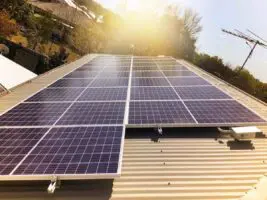The operator of the South Australia electricity network says it is to trial micro-grids with solar and battery storage in regional areas as a potentially cost-effective alternative to building or replacing poles and wires.
SA Power Networks, in its latest submission to the Australian Energy Regulator for spending over the next five years, says “micro-grid” technology has “particular promise” – both as a cheaper alternative to diesel, and as a potential solution to weather related black-outs that frequently plague regional areas.
In its submission, SA Power Networks says it needs to upgrade 31 remote power lines, and it will use a solar and battery storage based micro grid for one one them – at a cost of $2.8 million.
 It will be a combination of distributed storage and centralised storage, and will be considered as a future alternative option to remediate reliability or defer augmentation to remote communities.
It will be a combination of distributed storage and centralised storage, and will be considered as a future alternative option to remediate reliability or defer augmentation to remote communities.
Although micro-grids have existed for many years, both for individual customers and communities, they have generally relied on diesel generation as their prime means of electrical supply when islanded,” the company said in its submission.
“These types of systems are prohibitively expensive other than for customers that place a very high value on reliability of supply (for example, hospitals and data centres) or for customers that are remote and for which a grid connection is uneconomic.
“With the continued advancement of solar PV distributed generation capabilities, and anticipated cost reductions in battery storage technologies, new opportunities are arising for more cost effective micro-grids.
“With significant local generation already in place (solar PV) and if a material number of customers also take up battery technology, this investment by individual customers may be able to be leveraged to maintain supply to an entire community should that community’s network connection fail.”
SA Power Networks predicted last year that regional communities would ultimately focus on micro-grids, which would rely on renewables and storage, and could either be “stand-alone” or connected to the main grid with a “thin wire” as back-up. The savings to the network operator could be significant.
In Queensland, Egon Energy is now installing battery storage as a cheaper and more reliable alternative than upgrading the wires that connect coal fired power stations to regional consumers, and Western Australia is also looking to micro-grids as an alternative to “costly and unreliable” centralised grids.










